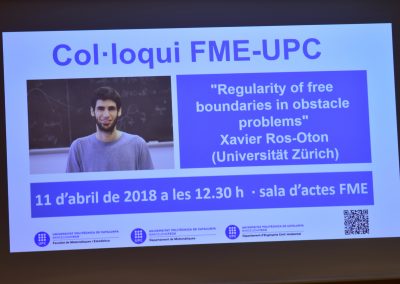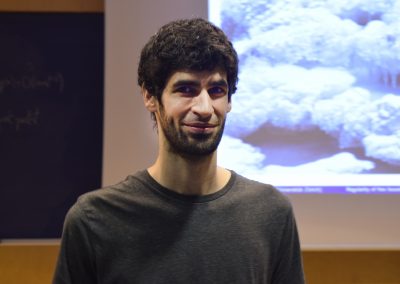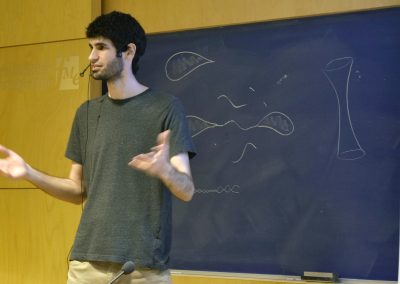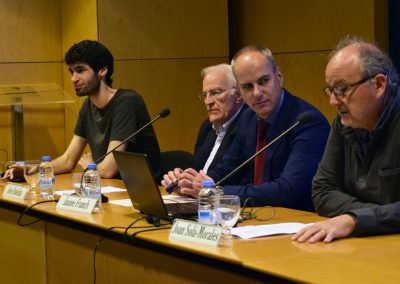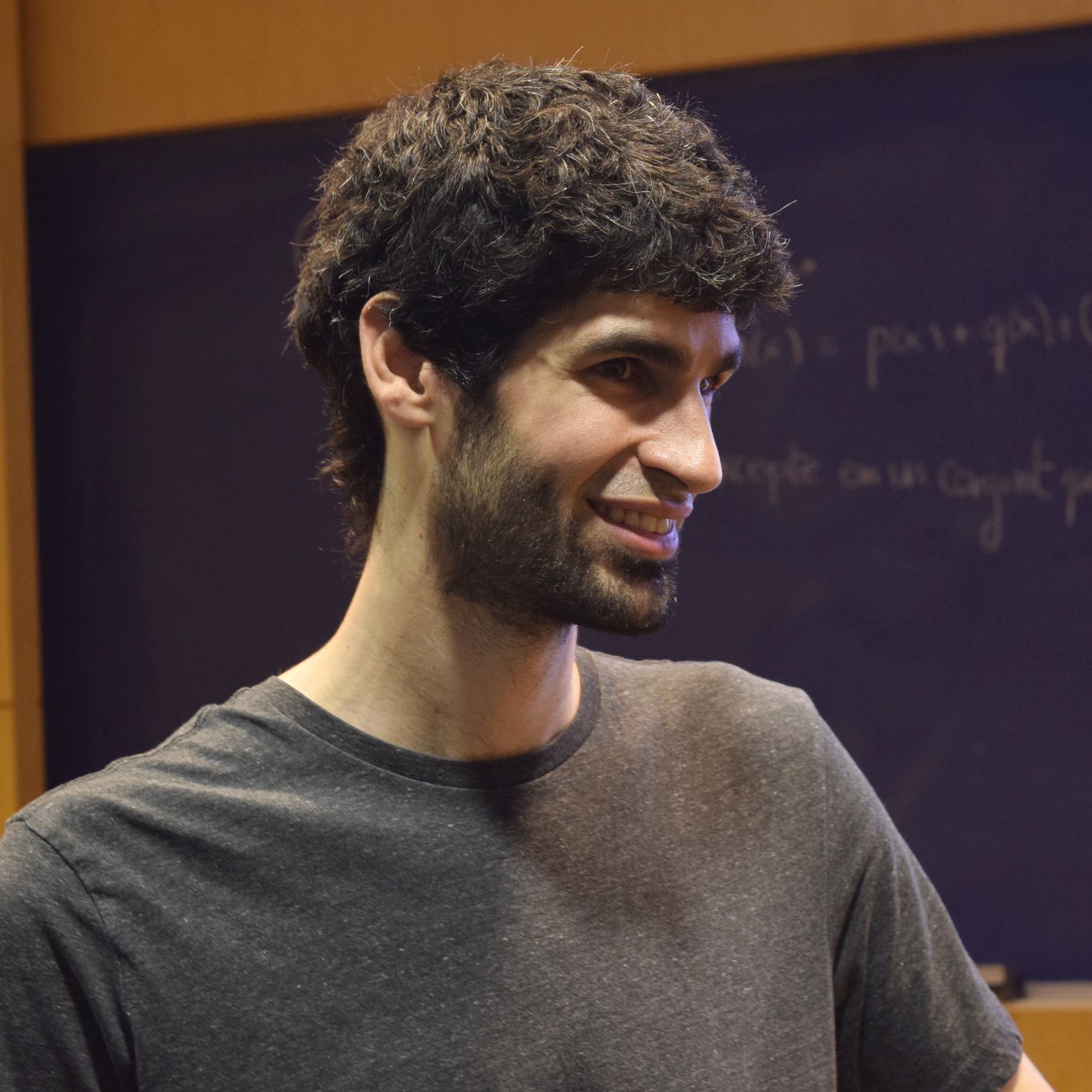PENTA NEWS
PENTA NEWS
Meet the partial differential equations tamer
The European Research Council awarded the Catalan mathematician Xavier Ros-Oton (University of Zurich) with an ERC Starting Grant. Xavier was in Barcelona in April. Penta met him and asked him for some advice. And no, you do not need to be a genius to be a good mathematician.
BGSMath alumnus Xavier Ros-Oton has recently been awarded an ERC Starting Grant, which comes with an allocation of more than one million euros for five years. His project, called EllipticPDE, is entitled “Regularity and singularities in elliptic PDEs: beyond monotonicity formulas.”
The European Research Council this year received 3,170 applications. Only about 13% of the applicants received funding. Ros-Oton, who currently works at the University of Zurich, is the only Spanish national in this round to have received one of the 11 ERC Starting Grants given to mathematicians throughout Europe. He is also the youngest of all ERC awardees in 2018.
This mathematician, who obtained his PhD in 2014 at the UPC with Xavier Cabré, has an impressive CV for a 30-year old scientist. One of the most cited mathematicians in his field, he held positions in universities in US and Europe, and collected many prizes and awards, among which the Antonio Valle Prize of the Spanish Society of Applied Mathematics and the J. L. Rubio de Francia Prize of the Spanish Royal Mathematical Society, two very prestigious recognitions awarded to brilliant young mathematicians.
Penta met Xavier when he visited Barcelona, in the spring, for a colloquium at the Faculty of Mathematics and Statistics of the UPC. “I always feel very welcome in Barcelona,” he said. He likes to define the equations he works on, Partial Differential Equations (PDEs for short), “the equations that move the world”. The reason for this is that not only do they solve centuries-old classical physics problems, such as the distribution of heat in a room, or how waves in a pond move after you throw a stone, or what is the shape of an electrostatic field, but they are also applicable to very different fields, such as biology (how does an invading population evolve?), finance (how does the price of a financial product evolve?), weather (how are the winds going to evolve?), or engineering (how to simulate the aerodynamics of a plane?). PDEs also appear in many pure math problems in analysis, geometry, or probability.
“PDEs are an exciting field to work in because we have a lot of questions to answer,” he says. “They are very interdisciplinary and we have work for years to come!”.
Ros-Oton’s pet problem is called Stefan’s Problem, dating back to 1831. In a nutshell, it’s the PDE that models the transition from water to ice and vice versa. In other words, it describes how ice melts. Technically, this problem belongs to a class of problems called “free boundary problems.” The same type of equations is also applicable in other fields, “as is often the case”, points out the young mathematician. “Finance, fluid mechanics, even pure mathematics. Mathematically, they are all the same problem. A very difficult one, but once you have some answers, you can apply them to a lot of different fields,” he says.
As anyone who attended one of his classes knows, Xavier likes to teach. “But I also want to have enough time for my research,” he emphasises.
How did you decide to become a mathematician?
Actually, I only decided my university career the year before the end of high school. Before, I had always liked maths and science, but wasn’t sure on what to do. Engineering was one option at the time. But in the last year of high school, I took part in the Math Olympiads and other competitions, and that helped me to choose maths. And now I am happy of the decision!
So happy that you were the fastest to get a degree.
Indeed, I quickly realised I could go faster than others and that I could be over before time. I asked the Dean if it was possible to skip one year, and they allowed me.
How do you manage the flattering opinions people tend to have about precocious mathematicians?
You always have to keep in mind that you are not the only one. You are never the smartest in the world. And if you work with smart people, this helps you to be humble. I always encountered many smart people throughout my career, and this has helped me a lot.
Does one have to be a genius to do mathematics?
A famous mathematician, Terry Tao, says that ‘the answer is an emphatic no’. I agree with him. It’s neither necessary nor sufficient. A great deal of math research is just being able to ask the right questions. It’s not enough to be very smart or a genius, you need to work on interesting problems. Of course, it helps that you are good at maths. But it’s far more important to be surrounded by good people. You can do very good science without being Tao.
You are a very extroverted person. Does that help?
If you are very solitary, or introverted, it is more complicated to speak with people. Travelling, collaborating, talking to people helps a lot in this field. There are of course examples of very weird mathematical geniuses, but most of us are not like that.
What’s the best way to face a new mathematical problem?
It really depends. Usually what you have to do, again, is to talk to many people. This can help you to ask the right question, or discover if other people have already tried to answer, and how. Of course, the more famous the problem or the conjecture is, the easier it is that someone has already tried to solve it. And probably, the harder it is to solve. Sometimes the question comes to you while you are working on something else. And you realise the question you have is much more general than you thought. Sometimes you do have brilliant ideas, but eureka moments are not that frequent.
You have been awarded many prizes and obtained consistent funding. How does a mathematician spend his research money?
Strictly speaking, to work I just need a blackboard and a computer. Most of the funding we have is used to travel. Travelling to conferences and meeting colleagues is very important for us. Mathematics, unlike what people think, is a very collaborative science. We also organise conferences, and we have to pay for travel costs for the speakers. And of course, once you start to have your own money and set up a group, you need to pay for the salaries of your students or postdocs.
Any advice for your young colleagues?
First of all, talk to the good people. Many of them. Try to think about problems they are working on. Also, make the effort to have a global vision of the field you are working on, don’t limit yourself to the tiny sector you are more specialised in. Be ready to change problem or even subject if you think another one is more promising. Also, keep in mind difficult problems all the time. You don’t need to be able to solve them, but don’t be afraid of the challenge. One needs to be realistic, but also ambitious. Finally, try to have a life outside maths. I like to go to the mountains and to play basket. Find your own hobby: keeping your mind free is healthy, also for your math!
Participants
“The equations that move the world” – interview by BBVA Foundation (in Spanish)

